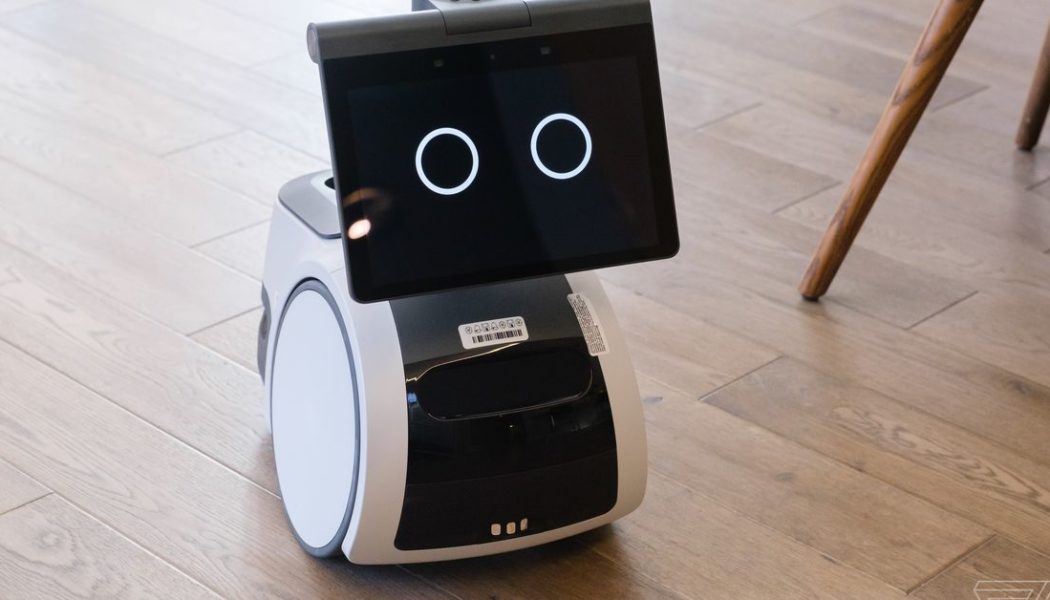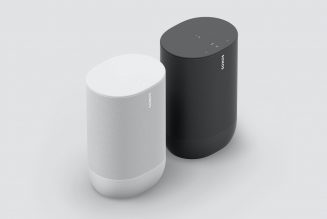
Yesterday, Amazon announced its “home robot” — a wheeled device named Astro that has a display, an array of sensors, and a camera that periscopes out the top of its body like a mast. In advertisements for Astro, Amazon presents the device as an engineering breakthrough and the realization of a long-held sci-fi dream: to build a robot that can help around the house.
This is rubbish, of course. What Astro is — for better or worse — is a camera on wheels.
The physical limitations of Astro are obvious. It has no arms or manipulators; no way to interact with the world other than bumping into objects at shin height. It can’t navigate steps, and, according to employees who worked on the robot and spoke to Vice, it is fragile and prone to self-destruction. “Astro is terrible and will almost certainly throw itself down a flight of stairs if presented the opportunity,” one told the publication. (Oh, and it absolutely cannot get a beer for you — a recurring meme when companies try to hype home robots).
But Amazon is still offering customers quite a bit with Astro, and for those worried about the privacy implications of this technology, the basic usefulness of the device needs to be reckoned with. Amazon says Astro will use facial recognition to identify people in your home and recognize intruders. (Again, though, Vice reports that this feature works poorly in the real world.) The bot can be set to “patrol” your house at night and can be activated and steered remotely, letting you peek through its periscope camera via your phone. In Amazon’s ad, a couple use this feature to double check they turned the stove off.
[embedded content]
This is silly stuff, but it’s useful, too. These are features many people will want. Everyone cares about keeping their home safe and, if you’re already investing in home surveillance but don’t want to put a camera in every room, then Astro may seem like an attractive solution. (Whether people will pay $999 for the pleasure, and whether Astro will actually work as promised, are open questions.)
It’s also worth remembering that although many people distrust or dislike Amazon because of its consistently appalling mistreatment of workers, its union-busting, and its tax avoidance, the company actually remains fairly beloved by the American public. In a survey The Verge ran in 2020, Amazon had the most favorable impression in the US of any tech firm and was judged to be second-most trustworthy after Microsoft. So the fact that Amazon is selling this roving camera won’t necessarily put people off the product.
Astro is also important for Amazon’s grand strategy. The company’s vision for tech is one of ambient computing — of rigging together a network of sensors, smart speakers, cameras, and digital assistants that are integrated into users’ homes. The company wants to provide convenience by organizing customers’ lives, ideally for a recurring subscription fee, just like with its Prime delivery service. And since it acquired video doorbell firm Ring in 2018, home security and surveillance have been an increasingly important part of this offering. So while many will complain that Astro is essentially a surveillance device, that suits Amazon fine.
Personally, I think Astro is a half-baked concept and part of a dangerous trend of ubiquitous and unthinking surveillance. Although I accept the fact that many people want this sort of technology in their home, Amazon in particular has repeatedly shown a lack of care and honesty in how it develops this sort of tech. In the past, the company has sold racially biased facial recognition systems and hackable security cameras; it aggressively partners with law enforcement and uses scare tactics to push its products on consumers. Looking at this history, I’m not sure why anyone would trust Amazon to oversee these sorts of systems.
But this is where Astro’s guise as a “home robot” becomes useful. For many people looking at Astro, it may appear to be just a novelty — indeed, it’s already drawn comparisons to robot “pets” like Aibo. But I think, like Facebook’s camera-equipped Ray-Ban glasses, the purpose of Astro is not to solve any particular problem but to neutralize the underlying concept: to get people used to having a camera that moves constantly around their home. Astro isn’t a home robot, it’s a camera on wheels, and that’s just what Amazon wants.









